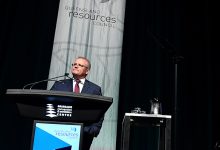The Morrison government has a chance to help Australia seize the resources and manufacturing opportunities being created by the switch to renewables and electric transport, as long has it can resist the urge to use a new ‘modern manufacturing strategy’ as another opportunity to channel funds into the gas industry.
A new federal government roadmap for Australia’s resources and minerals processing industries was released by the Morrison government on Thursday, a ten year vision for expanding Australia’s role as a leading global supplier of the minerals and metals needed in a future economy.
Federal minister for industry, science and technology Karen Andrews says the roadmap outlines opportunities for Australian resources and manufacturing companies to expand into producing the materials that are in demand from emerging green industries, including electric vehicles, renewable energy and energy storage.
“Opportunities …. include turning critical minerals into high value products like batteries and solar cells, as well as technologies and equipment that makes mining more efficient and safe,” Andrews said.
The ‘Resources Technology and Critical Minerals Processing’ roadmap notes that while Australia is a leading source of raw materials used in high technology industries, most of these raw materials are processed into more valuable products overseas.
“Australia has significant reserves of the critical minerals and metals which drive the modern global economy,” the roadmap says. “These are used to manufacture advanced technologies such as electric vehicles, mobile phones and renewable energy systems.
“However, because the majority of primary ores are shipped overseas for processing, Australia derives a small share of the potential overall benefit. Australia can capture greater benefit from these value chains by undertaking further value adding and manufacturing here.”
The roadmap draws upon the findings of a study commissioned by the Future Battery Industries Cooperative Research Centre, that found Australia is host to virtually all of the raw materials needed to produce clean energy technologies like batteries and electric vehicles, but is involved in almost none of the key value chains of these technologies, asides from being an exporter of the raw materials themselves.
Analysis undertaken by the CSIRO found that Australia is the world’s leading supplier of raw materials used in the production of lithium ion batteries, but has zero involvement in the remainder of the value chain, which is worth orders of magnitude more in terms of economic activity.

The Morrison government committed $1.3 billion in the last federal budget to fund its ‘modern manufacturing initiative’, in an effort to revive Australia’s manufacturing sector and foster new manufacturing capabilities in sustainable industries.
However, the government sees the ‘modern manufacturing strategy’ as complementing its ‘gas led recovery’, and this has led to fears that it is all an effort to further support the fossil fuel industry.
When prime minister Scott Morrison launched the initiative in a speech to the National Press Club last year, Morrison said that he expected that gas would play a larger role in the energy market as he did not think that battery technologies were ready to deliver sufficient supplies of dispatchable power.
“Now, we know that batteries are not at that scale yet. They’re not at that scale yet,” Morrison said at the time. “And gas is – as I said, it selects itself because there is not another resource that can so quickly peak to support the renewables.”
The Morrison government has also provided an additional $49.8 million in public funds provided to gas producers to develop up to five new gas basins across Australia.
It seems there are two possible paths for Australia’s ‘modern manufacturing strategy’ – either the government works to ensure Australia is able to capture more of the value from the materials it exports, by capturing more of the value chain for products like batteries and electric vehicles – or it attempts to prop up demand for fossil fuels.
Climate Council spokesperson and economist Nicki Hutley said the new resources roadmap could be a positive step towards pivoting Australia’s resources sector towards supplying green industries, including by positioning Australia as a leading provider of materials used in the production of batteries and electric vehicles.
“Boosting our processing capability of rare earth and other critical minerals can add value to our economy and support growth in our manufacturing sector,” Hutley said.
“Processing minerals domestically could give Australian manufacturers a major competitive advantage in manufacturing renewable energy technologies, batteries, and electric vehicle parts.”
Key to this, as Hutley also points out, is ensuring that the focus is on the resources and manufacturing industries that are set to be in high demand in a low emissions economy, rather than trying to prop up ailing fossil fuel industries.
“Ultimately, this roadmap is a promising step towards a self-reliant minerals manufacturing sector, the development of technologies that tackle climate change, and a prime position in the global minerals market,” Hutley added.
“To help manufacturers be low-carbon as well as competitive, governments must increase the supply of affordable renewable energy to power new minerals processing operations.”
“But the Government’s support for a gas-led recovery instead of a plan to power Australia with clean, affordable renewable energy is a roadblock to its success,” Hutley said.
The Morrison government is expected to publish similar road maps for other priority industries, including the food and beverage industry, the recycling and clean energy sectors, and defence.










